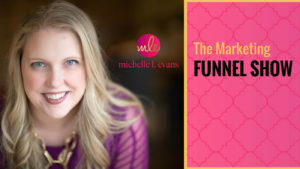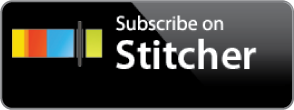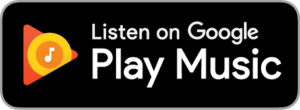
Episode 80: An Inside Peek at Building a Quiz Funnel (With Me!)
On this episode, I am absolutely thrilled to introduce you to the founding partners of She Leads Academy: Chrissie Carl and Tiffany Green.
Chrissie is a former client of mine who I coached back in 2013-2014 as she was leaving her job at Microsoft. We stayed in contact over the years as she grew her business. When she made a pivot in her business to co-found She Leads Academy with Tiffany, I was thrilled that they wanted to work with me on their first marketing funnel because I truly believe in the mission and purpose of their work together.
She Leads Academy helps high-achieving women define what it means to live their version of a “good life” and guide them in the process of making it a reality.
Chrissie and Tiffany are both high-achieving women who had to learn the hard way what it means to live their own versions of a ‘good life.’
Here’s a bit more about Chrissie:
She grew up on a farm in Missouri where she developed a strong work ethic, which served her well in her career. A few years after graduating from university, Chrissie began working for Microsoft Corporation in Seattle.
She took pride and pleasure in being productive and making a positive impact. But as the years passed, she began to feel overworked and exhausted. On paper, Chrissie was succeeding professionally and personally, yet she was feeling less fulfilled and not at all like her true, vibrant, and passionate self. After a spiritual crisis and against the advice of many, she walked away from her flourishing, 14-year career at Microsoft to reclaim her life and redefine success on her own terms.
Today, Chrissie is a career counselor and corporate spiritual guide who helps others restore balance and thrive in their careers without sacrificing their personal joy. She now looks back on that crisis as one of the defining moments in her life. Had it not been for that struggle, she would not be able to experience the freedom and joy she does today and help other women find their own path to living their version of the good life.
Here’s a bit more about Tiffany:
Tiffany can see how the seeds of her high-achieving personality were planted early. She excelled in school and took pride in being an A student. After college, she began a career in marketing. She viewed hard work as her pathway to happiness and success. After several years, Tiffany realized she wanted to work with more of a direct impact on her community and decided to pursue a career in non-profit fundraising.
She brought her same work ethic and commitment to her new career in philanthropy. Slowly, work became more demanding at the expense of her overall health and well-being. After an illness — which served as her wake-up call — Tiffany made her health and work-life balance top priorities in her life. Today, she is a coach, counselor, and chaplain. She specializes in helping high-achieving women find greater clarity during life and professional transitions while creating a greater sense of balance, meaning, and connection.
Let’s jump into the interview.
 Biggest Show Takeaways:
Biggest Show Takeaways:
Tell us a little bit about your business and how the two of you came together.
-
- We met at Loyola University in Chicago. We were both getting our master's in pastoral counseling. We met at a professor's dinner party. We both realized instantly that we had a lot in common, and we bonded over our shared connections.
- A couple of months later, we created a course together — an addictions course. Tiffany and I decided to do something pretty unique and that was workaholism. We did research together. Went to Workaholics Anonymous meetings and what not. We did the project, and we worked very well together. Out of that was born these conversations about starting She Leads Academy together.
Why did workaholism as a topic stand out? It’s something that's kind of an accepted addiction that people proudly wear on their sleeve, so why did it interest you both?
-
- Being high achieving and busy is glorified in our society. The two of us have had unique but similar experiences.
- Chrissie: About a year after signing on for a dream job, I found that I was feeling overwhelmed. I was feeling overburdened. I started to feel resentful towards my job. I was having a spiritual crisis. There was the manifestation of that dissatisfaction to physical symptoms. There isn't really a road map for getting out of that and untangling yourself from that situation. What I did was I paused. I left Microsoft after 14 years. I worked on getting healthy. I also started redefining success on my own terms, reclaiming my life by really listening to myself and figuring out what brings me joy.
- Tiffany: Like Chrissie, I’ve always been a go-getter, very ambitious and focused. After college, I was determined to move to the big city. I was working my way up the professional ladder. After a few years, I decided I wanted to do something different. Because of my background in business, the place that made the most sense to me was the nonprofit world.
- I found a dream job, then, the great recession happened. Programs got smaller. My team got smaller. Our budgets got smaller. Because I have this go-getter personality, I found myself just working that much harder, like checking emails from the moment I woke up to the moment I went to sleep. My body revolted. It said enough. My immune system was shot. I ended up catching pneumonia that was not responding to antibiotics.
- Ultimately, I had to be hospitalized. I remember lying in that hospital bed, barely able to breathe, and I told myself that I had done this to myself. A lot of the decisions that I had made, a lot of the actions that I had taken, had led me to this situation. I said, “If I get up, and I walk out of here, I'm going to do things differently.” I decided I was going to go back to school full-time and do some consulting and freelance work on the side.
- We wanted to make a difference for other women. That’s how we decided to come together and form She Leads Academy. We believe that you can grow by pain, or you can grow by wisdom. If women hear our stories, they can see themselves in us. What we're hoping is that they won't have to experience the pain that we did. They can learn from wisdom.
Tell us the high level of what She Leads Academy is all about.
-
- She Leads Academy is focused on helping ambitious women, like ourselves — high performing and high achieving — thrive in their careers without sacrificing their personal joy. Doesn’t matter what that career is; it can be anything.
When we started working together, you decided you wanted to create a marketing funnel. Can you talk a little bit about what your goal was in wanting to create a funnel for your business?
-
- Our business had been growing organically through our different counseling practices, but what we wanted to do was reach beyond that, beyond this organic growth, beyond referrals. One thing that we knew from when we were going through burnout is that there is this embarrassment and some shame. You really don't want to admit that you feel like you're losing your edge, right?
- We wanted to be able to connect with women who didn't know us, who hadn't heard of us. We wanted to make sure that the message and tone were right. We knew that they didn't have much time to research it themselves. We took ourselves back to a time when we were in that phase where we just felt like we were busting at the seams.
- We asked ourselves what would we have wanted at that time, and what would have helped us? And we knew that it was having someone say they see us, understand what we’re going through, and could relate in the same way. We wanted to give people something to connect with so they don't feel as alone and to have our message be real.
- We also wanted to come up with an organized way to communicate with women. Tone was really important to us because these are high achieving women. They're successful. The things that worked for them before are not working as well as they did in the past. We wanted to be respectful. We want to honor the work that they have done. We also wanted to let them know that we understand — we've been there — on both sides of it. We understand from being professional coaches. And we also understand because we lived this. We've had these experiences.
Why did you choose to create the kind of funnel that you did?
-
- We actually created a quiz, “Are You a High Performing Woman Spread Too Thin?” where women can go and answer our questions and identify their work archetype. Based on their work archetype, what we do is we give them some concrete steps that they need to take and, potentially, things to be more aware of in order to help support them in not having the experiences that we did.
- Women that are in this situation are often moving through life so quickly that they kind of become detached from some of those feelings or sensations that might be happening beneath the surface. The quiz is to give them insights into their type. It gives them an opportunity to acknowledge some behaviors or some feelings that they might have.
- In addition to giving them the insights, it gives them the pros of those insights or those behaviors that they have. How does that show up in really positive ways in their life? But it also highlights what may be the “con” or the sacrifice of some of those same feelings and actions that they have. But, really, it's more about acknowledgment and giving them some information that might help them be a little bit more aware of their current situation and the actions and behaviors and feelings that they're having.
What was your biggest concern in building a marketing funnel?
-
- We didn't want to come off as pushy. We wanted to engage in a very real, conversational way.
- We also were concerned about the mechanics of the funnel; what are the steps that we follow? What about the technology on the backend? How do you put the pieces together and support them, technologically?
- We were concerned that when we found someone, it could be that we were spending a lot of money to find that ONE person — and it might not be successful.
What did you learn through the process of creating a marketing funnel?
-
- There was something very empowering about being able to create a sales funnel because once people go through the process of doing it, they understand it’s not as mysterious as they think it is. It’s a process, and anyone can do it.
What was the biggest ah-ha that you had in going through and building your first funnel?
- Once you create one funnel, you have the knowledge. You have the insights. You have the resources in order to carry this forward so you can build on it. There is a formula, and it's clearcut. Now we can do another one and another one. It's not just that we did it, but we really learned how to do it.
- The work that we had to put in in order to get to the point where we were ready to start our funnel, where it was critical information that we dissected and massaged. We did research, but after we had done all of that background work, we were able to get our funnel up in two weeks. It took us a while to get to that point.
- With Michelle’s support, we were able to knock it out. Get all of our emails written, do all the technology in two weeks. We were really pleased about having the opportunity to do that so quickly.
Now that you have your quiz and accompanying funnel in place, it's a great way to engage people. So, how do you feel about driving traffic to it?
- It's been quite easy and has felt very natural. That’s partly because the language that we have within the quiz — and we have such faith in what the quiz can offer people — that we know it's just the right thing for the women who are going through a burnout right now.
- Its effectiveness has been proven by the number of discovery calls we’ve done and also, just the responses. People will respond back to those emails, and we get to connect with them. It’s meaningful, and that's what we were looking for.
- There's so much coming out right now about burnout with people vocalizing more about not just work-life balance but work-life integration. That means there are opportunities where it just feels very natural to put it out there and to be able to frame it in a number of different ways.
For the two of you, if you were to talk to a friend who was in your role where they're like, “We have this great program, we just need to figure out how to connect with the right people,” what would you say to them about working with me, Build Your Funnel Bootcamp, or really just thinking about a marketing funnel, in general?
- You helped us walk our talk. We want women to connect with us and be open and vulnerable about the situations that they're facing. Working with you, we recognized that we had to take a lead in doing that ourselves if we wanted to make sure that other women knew that we were the right people.
- We tell people to come to talk to you! You provide help and support and have the knowledge people need. But more importantly, you care about the businesses of the people you work with and want them to be successful. You're a one-stop shop doing the A to Z. You’re training your clients to do it for themselves.
Anything else you’d like to share?
- We walked away from this process with so much confidence. We have so much knowledge and experience, but we would go to boil down our message, and we would end up being left with something that didn’t resonate. You had us open that process back up again, and that was unexpected. We felt like we knew a lot on the topic. We knew how to talk about it. When it came to the funnel, there were just some unexpected ways that we got really clear around our message and the different types of clients. How to look at them differently.
- Want to know which marketing funnel is right for you and your business? Take this free and easy quiz, and in less than 5 minutes, you’ll know EXACTLY which funnel is right for you.
Links mentioned in this episode:
- She Leads Academy website: www.sheleadsacademy.com
- She Leads Academy quiz: Are you a high performing woman stretched too thin?
- Marketing Funnel Quiz: https://www.michellelevans.com/marketing-funnel-quiz/



